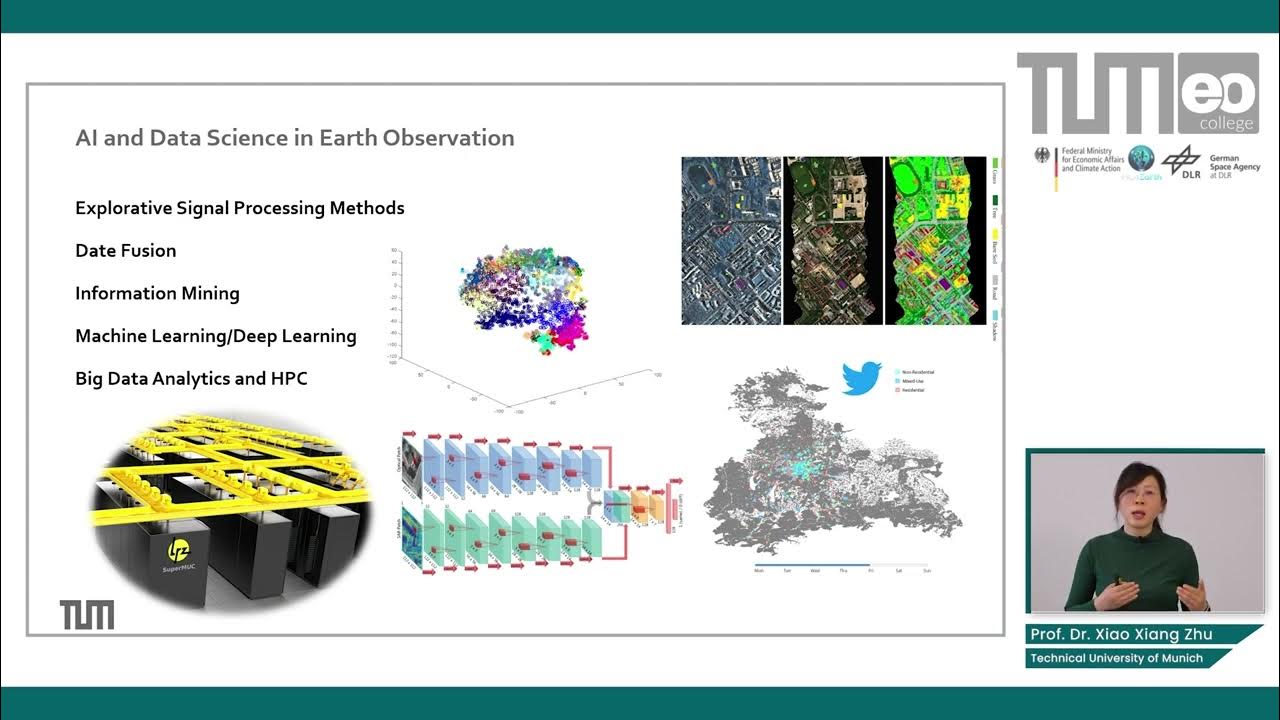Ethics in AI4EO - Basic Concepts
Summary
TLDRIn this segment on ethics in artificial intelligence for Earth observation, Minalin Kup explores foundational ethical concepts such as right vs. wrong, ethical issues, dilemmas, and decision-making. She discusses the Golden Rule, the importance of honesty, integrity, and fairness, and cultural relativism, illustrated by the trolley dilemma. The video delves into deontological and consequentialist approaches to ethical decisions, emphasizing their application in emerging technologies like AI. Kup highlights the challenges posed by AI research, such as potential biases, and how these ethical frameworks are crucial for addressing such issues in Earth observation.
Takeaways
- 😀 Ethics is about distinguishing between right and wrong, good and bad, and applies across cultures with the Golden Rule: 'Don't do to others what you wouldn't want others to do to you.'
- 😀 Ethics in research involves three foundational principles: honesty, integrity, and fairness, which should be considered in daily research.
- 😀 Ethical issues arise when actions can result in both positive and negative outcomes, requiring careful ethical decision-making.
- 😀 Ethical dilemmas involve situations with no clear right or wrong answer, often requiring a choice between two negative outcomes.
- 😀 The trolley dilemma exemplifies an ethical dilemma where a decision must be made to minimize harm, but context (e.g., the age of individuals) can influence the decision.
- 😀 Cultural relativism shows that ethical decisions, like those in the trolley dilemma, may differ based on cultural context, as seen in the global variations between Eastern and Western perspectives.
- 😀 Ethical decision-making often involves approaches like duty-based (deontological) ethics, which focuses on duties, and consequence-based (utilitarian) ethics, which focuses on outcomes.
- 😀 In hypothetical scenarios, such as giving a ride to people in need, the decision may vary based on cultural ethics and personal relationships, leading to different ethical outcomes in the West versus the East.
- 😀 Emerging technologies, like facial recognition, raise ethical issues about privacy, with differing responses in different regions, as seen in the contrasting reactions between the US and Europe.
- 😀 Ethical relativism becomes more complex in AI research and applications, where researchers may not fully understand the consequences or their duties, as shown in the case of AI-generated images with data bias.
Q & A
What is the definition of ethics according to the script?
-Ethics is about distinguishing between right and wrong, good and bad, and what is an ought versus what is not an ought. It is also based on the Golden Rule: 'Don't do to others what you wouldn't want others to do to you.'
What are the three basic principles of ethics discussed in the script?
-The three foundational principles of business ethics discussed are honesty, integrity, and fairness.
What is an ethical issue, and how is it different from an ethical dilemma?
-An ethical issue involves actions that can have both positive and negative consequences, creating a situation that requires ethical decision-making. An ethical dilemma, however, involves a situation where both options lead to negative consequences, and the decision-maker must choose the lesser harm.
What is the concept of ethical relativism, and how does it relate to the trolley dilemma?
-Ethical relativism is the idea that ethical decisions can vary based on cultural context. In the trolley dilemma, people from different parts of the world (Eastern vs. Western cultures) may make different choices depending on their cultural values, such as saving an elderly person vs. saving a child.
What example is used in the script to illustrate ethical decision-making in a difficult scenario?
-The example provided is a hypothetical scenario where you are driving alone in a storm and must decide whom to give a ride to among three people: a best friend, a romantic interest, or an elderly woman in urgent need of medical care.
What are the two dominant ethical approaches mentioned in the script?
-The two dominant ethical approaches are the duty-based (deontological) approach, which focuses on one's duty in a situation, and the consequence-based (consequentialist) approach, which focuses on the outcomes of actions.
How does ethical decision-making differ when applying the duty-based vs. consequence-based approaches?
-The duty-based approach prioritizes the fulfillment of duties and responsibilities, whereas the consequence-based approach evaluates the outcomes of actions to determine the right course of action. This can lead to different conclusions in the same ethical scenario.
How does cultural relativism play a role in ethical decision-making in different parts of the world?
-Cultural relativism means that ethical decisions can differ depending on cultural contexts. For example, in the case of a self-driving car making a life-or-death decision, people in Eastern cultures may prioritize saving the elderly, while those in Western cultures may prioritize saving a child.
What issue is raised by the use of facial recognition technology in the U.S. immigration context?
-The issue raised is the compromise of personal privacy and data security. The script questions whether similar policies and systems would be accepted in countries like Germany or other parts of Europe, where privacy concerns might lead to different reactions.
What is the example given in the script about AI bias, and how does it relate to ethics in AI?
-The example is about Duke University students who used AI to upscale a low-resolution image. The AI, due to data bias, incorrectly upscaled an image of Barack Obama into a white male. This highlights the ethical implications of AI systems and the consequences of data bias in AI training.
Outlines

هذا القسم متوفر فقط للمشتركين. يرجى الترقية للوصول إلى هذه الميزة.
قم بالترقية الآنMindmap

هذا القسم متوفر فقط للمشتركين. يرجى الترقية للوصول إلى هذه الميزة.
قم بالترقية الآنKeywords

هذا القسم متوفر فقط للمشتركين. يرجى الترقية للوصول إلى هذه الميزة.
قم بالترقية الآنHighlights

هذا القسم متوفر فقط للمشتركين. يرجى الترقية للوصول إلى هذه الميزة.
قم بالترقية الآنTranscripts

هذا القسم متوفر فقط للمشتركين. يرجى الترقية للوصول إلى هذه الميزة.
قم بالترقية الآنتصفح المزيد من مقاطع الفيديو ذات الصلة
5.0 / 5 (0 votes)






